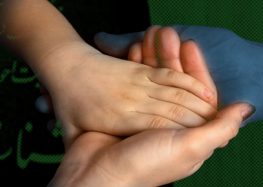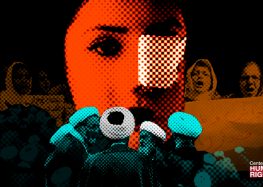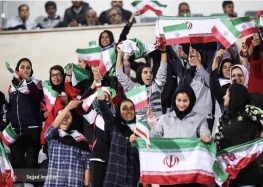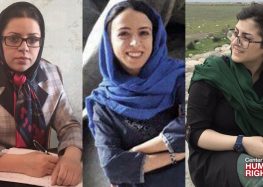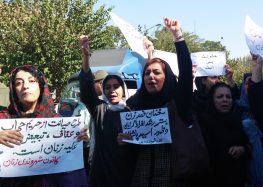Disqualification of Elected Female Reformist MP Sparks Heated Debate in Iran
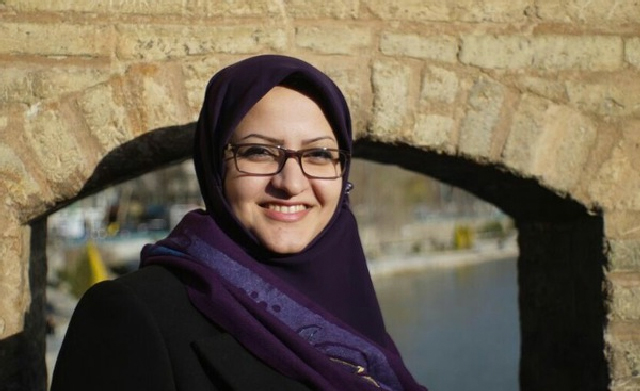
Two weeks have passed since Minoo Khaleghi’s election to Parliament in Iran’s recent elections was nullified without an explanation by the Guardian Council, the body charged with vetting candidates.
Some conservative pundits have speculated that the young female reformist from the city of Isfahan was disqualified because photos emerged of her shaking hands with a man during a trip abroad. Others have described the allegation as a weak rumor.
“This matter should have been left to Parliament to investigate,” the prominent conservative MP Ali Motahhari told the press on April 3, 2016, according to the semi-official Iranian Student News Agency (ISNA). “The accusations laid against her are not strong.”
“If she did shake a man’s hand abroad, it’s not going to be easy to prove and besides, it’s not wrong to shake an unrelated man’s hand with gloves on,” he added.
Touching a member of the opposite sex who is not a relative is illegal in Iran.
The Interior Ministry has meanwhile claimed ignorance as to why the Guardian Council, which arbitrarily disqualified thousands of candidates from running in the February 26, 2016 elections, decided to reject Khaleghi’s victory.
“We know nothing at all about the reason for this nullification… but in our view, Parliament should be deciding these matters, not the Council of Guardians,” said Mohammad Hossein Moghimi, the head of the Interior Ministry’s Elections Headquarters, on March 28, 2016, according to the semi-official Iranian Labor News Agency (ILNA).
“Our legal understanding of the invalidation of the votes for Isfahan’s third [top] elected representative is different from the Council of Guardians… You need to ask our friends there as to why she was disqualified,” said Interior Ministry Spokesman Hosseinali Amiri on March 28, 2016, according to the state-controlled Islamic Republic of Iran News Network (IRINN).
According to a report published on April 4, 2016 in the reformist Vaghaye Ettefaghieh newspaper, Khaleghi was the victim of a smear campaign by the husband of one of Khaleghi’s competitors.
The husband, a city official, allegedly spent substantial money on his wife’s election bid and committed widespread campaign violations after it became clear that his wife would not receive enough votes to win against Khaleghi.
An unnamed relative of Khaleghi was meanwhile quoted saying that the Guardian Council was handed “personal and private photos that could have only been obtained by hacking her phone.”
“When Minoo went to the Council of Guardians, she was shown an old photo of a woman with a blurry face wearing sun glasses,” said the relative. “She told them it wasn’t her in the photo.”
The relative was implying that the photos either showed Khaleghi in non-Islamic attire, or shaking the hand of a man who is not her relative.
But Khaleghi rejected the newspaper’s report a day after it was published for being “far from the truth” through a post on her Instagram account, and promised to take legal action against the Guardian Council.
“Invalidating the votes cast for one candidate after announcing the final results for a constituency certainly begs for legal investigation,” she said.
Khaleghi has not received an official reason for her disqualification.
“There has been every kind of rumor and immoral talk surrounding me,” said Khaleghi on March 23, 2016 in a statement. “These actions are all aimed at questioning my reputation as a Muslim and as such are punishable according to Sharia law.”
Ali Nekooie, the chairman of the reformist faction’s campaign in Isfahan, also claimed in an interview with ILNA published on April 1, 2016 that another candidate had tried to sabotage Khaleghi.
“The reformist forces know that [Minoo Khaleghi], the third winner in Isfahan’s elections, is blameless and innocent despite all the cynical rumor-mongering,” he said. “Even if she committed a minor offense, the people of Isfahan do not deserve to see their votes invalidated.”
Isfahan’s reformist faction also described the disqualification as a “rare and unacceptable decision by the Council of Guardians” and criticized the government for not taking action to restore Khaleghi’s election in a letter to President Hassan Rouhani on April 1, 2016.
Khaleghi’s disqualification could turn out to be “one of the most bitter and unfortunate developments” in the history of parliamentary elections in the Islamic Republic, said female reformist political activist Azar Mansouri on her Telegram page on March 27, 2016.
After being vetted by the Guardian Council, Khaleghi became one of 14 female candidates elected to Parliament in the first round of Iran’s February 26, 2016 elections.
The city of Isfahan has five representatives in Parliament. Khaleghi received the third highest number of votes.
After she was disqualified, some officials said her replacement could be voted in during an interim election occurring two years from now. But on March 23, 2016, Isfahan’s Governor General Rasool Zargarpour had proposed handing over Khaleghi’s seat to Alireza Ajodani, the candidate with the sixth highest number of votes.
Ajodani, like Khaleghi, was on the list of candidates supported by the reformist camp. It therefore appears that the conservative Guardian Council is not only blocking a female reformist candidate from taking a seat in Parliament—it’s actually refusing to accept any reformist as her replacement.
“The spokesman for the Election Monitoring Central Headquarters has said that the fate of [Isfahan’s] remaining representative would be determined in the interim elections,” said Isfahan’s reformist faction in its letter to Rouhani on April 1, 2016.
“But there are objections because based on current procedures, the seat should go to the candidate with the next highest votes,” continued the letter.
“Ignoring this creates the impression of partisan purges,” he said.

